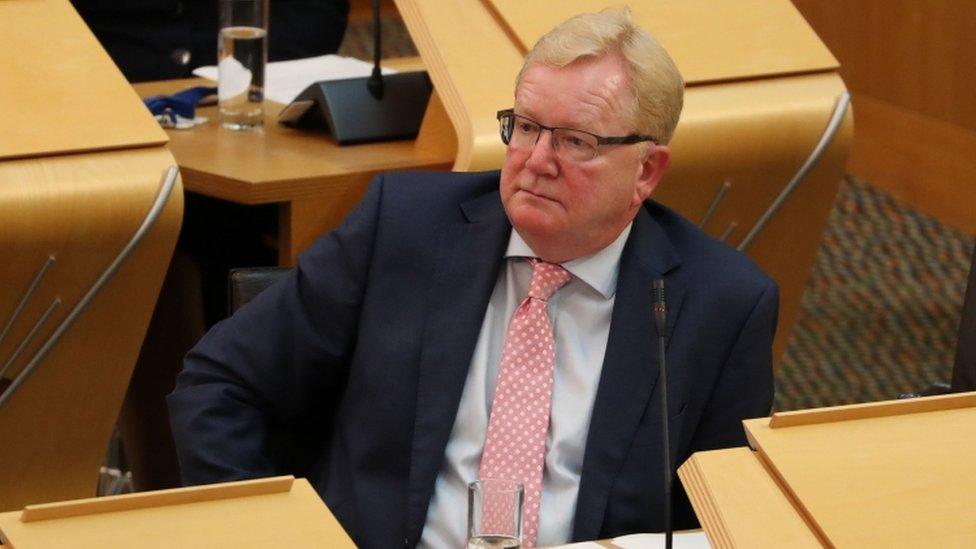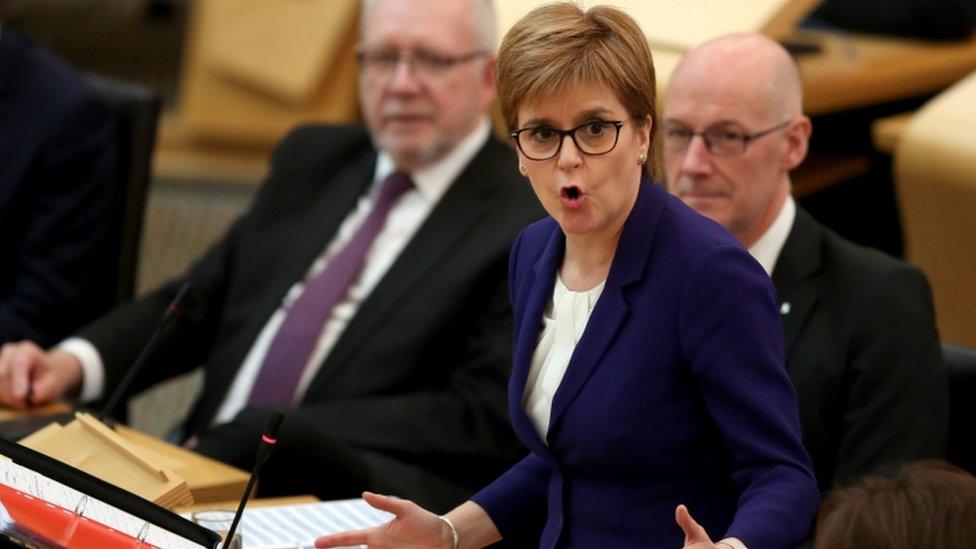How long will Jackson Carlaw remain interim Scottish Conservative leader?
- Published

Mr Carlaw has been interim leader of the Scottish Conservatives since Ruth Davidson quit in August
These are times of deep uncertainty. In the past, if I asked politicians to outline the future, I would receive an extract from their manifestos, past, present or to come.
Ask the same question now and the response is, at best, an apologetic shrug.
The times are so disquieting, indeed, that words no longer mean what they did. Does Brexit still mean Brexit, for example?
Then there is the seemingly innocuous term "interim". Pretty clear, one would think. Temporary, provisional. Or relating to less than a full year (as in "interim results".)
But, in this newly elastic mid-Brexit world, the concept has been extended, prolonged.
And so it would appear that Jackson Carlaw, the interim leader of the Scottish Conservatives, might be in post for rather a lengthy period.
Strictly, of course, that does not entirely shatter the concept. He is interim in that he lies between she who has stepped down, Ruth Davidson, and the leader yet to emerge. In due course.
Some Scots Tories, it would seem, are fretting about how long that course might last. About when the leadership contest might be due. OK, a few. OK, perhaps one or two.
Mr Carlaw has made two points, not unreasonably. One, that he did not cause the situation whereby his party finds itself once again leaderless, but this time during a gargantuan constitutional crisis.
Two, that said gargantuan constitutional crisis means this might not be, all things considered, the best time for a contest which, by definition, involves lengthy and extensive internal contemplation.
Most, frankly, accept both points. But Mr Carlaw provoked controversy when he suggested that the Scottish Tories would now back the Prime Minister on Brexit, wholly and completely.
That position, which emerged at the weekend, means backing the PM's suggested alternative deal on Brexit. But it also means, as Mr Carlaw has conceded, putting up with a no-deal departure from the EU, if such is required.

Ms Sturgeon highlighted newspaper reports that some of Mr Carlaw's colleagues want to oust him next week
Ms Davidson made her name, at least in part, by campaigning vigorously and volubly for Remain during the Brexit referendum. Against one Boris Johnson, as it happens.
Subsequently, as leader, she turned her sceptical eye upon the possibility of a no deal Brexit. And pronounced that this was a concept up with which she would not put.
Perhaps one might note at this point that her position was by no means guaranteed to end well. Could she, for example, order Scottish Tory MPs to vote in a fashion which frustrated no deal?
In practice, she could not. She could urge. She could cajole. But the Tory Whips' Office in the Commons, an imposing cadre of disciplinarians, would have had counter arguments to offer. And they have clout.
It was all, perhaps, destined to reveal, once again, the conundrum which can beset the Scottish leaders of pro-Union parties - when their instincts run contrary to the exigencies of Commons partisanship.
That, however, now lies in the past. Perhaps motivated by UK party loyalty, perhaps driven by the impetus to get Brexit done, Mr Carlaw has now reversed Ms Davidson's position.
At Holyrood, Nicola Sturgeon offered her own analysis as to the likely political consequences of this about-turn.
First rule of politics
You will doubtless be astonished to learn that she did not regard Mr Carlaw's strategy as a thing of wonder, to be revered.
Indeed, she thought his name would be a hissing and a byword for all sensible Scots.
All of which left Mr Carlaw up against it. He opted, wisely, to follow the first rule of politics. When in the mire, attack.
The first minister and the SNP, he said, had thwarted progress at all stages. They had said they would act to rule out no deal - yet had voted repeatedly against the deal on offer.
Further, they were now committed to doing the same again with Mr Johnson's new deal.
By now, of course, the first minister was hanging her head in shame, wasn't she? She was offering up a sorrowful, repentant countenance, and begging for forgiveness. Her remorse was total.
Or rather not. The Johnson deal, she argued, was utterly inimical to Scottish interests - and, what was more, contrary to declared Scottish opinion. It would strip Scotland from the single market, the customs union and the entire EU.
"Shame", she told Mr Carlaw, "on you".
She noted further that, in backing the new Johnson deal, Mr Carlaw was accepting, in effect, the concept of a border down the Irish Sea.
Something which, again, Ruth Davidson had said was completely unacceptable. As the FM spoke, Ms Davidson nodded her head, slowly, gently but perceptibly. Perhaps, though, it was simply an acknowledgement of times past, rather than an endorsement of the FM's attack.
And what of Mr Carlaw? Most Tory MSPs, to whom we have spoken, offer him support, probably aware that he is in a notably difficult situation, again not of his own construction.
Some, certainly, feel that there should have been wider internal consultation before the change of tack was pronounced. Some are simply disquieted by the relentless march of events, wishing for a period of calm and silence.
For now, the interim leader remains just that. Interim. But also leader.
